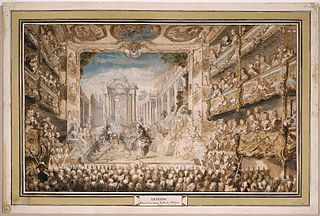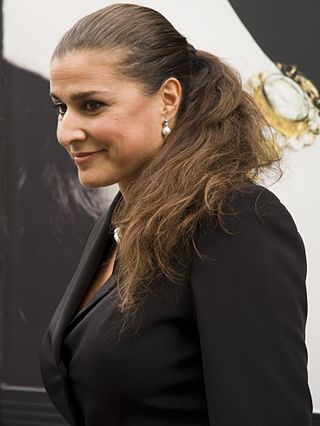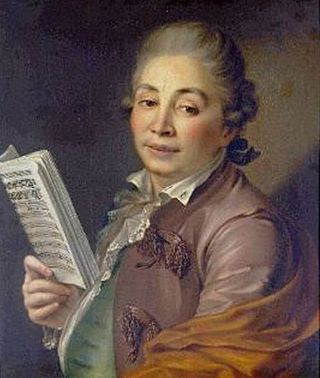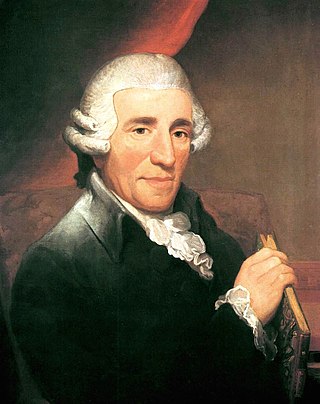
Antonio Salieri was an Italian composer and teacher of the classical period. He was born in Legnago, south of Verona, in the Republic of Venice, and spent his adult life and career as a subject of the Habsburg monarchy.

Armide is an opera in five acts by Jean-Baptiste Lully. The libretto by Philippe Quinault is based on Torquato Tasso's poem La Gerusalemme liberata. The work is in the form of a tragédie en musique, a genre invented by Lully and Quinault.

Rinaldo is an opera by George Frideric Handel, composed in 1711, and was the first Italian language opera written specifically for the London stage. The libretto was prepared by Giacomo Rossi from a scenario provided by Aaron Hill, and the work was first performed at the Queen's Theatre in London's Haymarket on 24 February 1711. The story of love, war and redemption, set at the time of the First Crusade, is loosely based on Torquato Tasso's epic poem Gerusalemme liberata, and its staging involved many original and vivid effects. It was a great success with the public, despite negative reactions from literary critics hostile to the contemporary trend towards Italian entertainment in English theatres.

Josef Mysliveček was a Czech composer who contributed to the formation of late eighteenth-century classicism in music. Mysliveček provided his younger friend Wolfgang Amadeus Mozart with significant compositional models in the genres of symphony, Italian serious opera, and violin concerto; both Wolfgang and his father Leopold Mozart considered him an intimate friend from the time of their first meetings in Bologna in 1770 until he betrayed their trust over the promise of an operatic commission for Wolfgang to be arranged with the management of the Teatro San Carlo in Naples. His closeness to the Mozart family resulted in frequent references to him in the Mozart correspondence.

Cecilia BartoliOMRI is an Italian coloratura mezzo-soprano opera singer and recitalist. She is best known for her interpretations of the music of Bellini, Handel, Mozart, Rossini and Vivaldi, as well as for her performances of lesser-known music from the Baroque and Classical period. She is known for singing both soprano and mezzo roles.

Jerusalem Delivered, also known as The Liberation of Jerusalem, is an epic poem by the Italian poet Torquato Tasso, first published in 1581, that tells a largely mythified version of the First Crusade in which Christian knights, led by Godfrey of Bouillon, battle Muslims in order to take Jerusalem. Tasso began work on the poem in the mid-1560s. Originally, it bore the title Il Goffredo. It was completed in April, 1575 and that summer the poet read his work to Duke Alfonso of Ferrara and Lucrezia, Duchess of Urbino. A pirate edition of 14 cantos from the poem appeared in Venice in 1580. The first complete editions of Gerusalemme liberata were published in Parma and Ferrara in 1581.
Armide is the French and English form of the name Armida, a sorceress in Tasso's Gerusalemme liberata, after whom are also named:
Armide is an opera by Christoph Willibald Gluck, set to a libretto by Philippe Quinault. Gluck's fifth production for the Parisian stage and the composer's own favourite among his works, it was first performed on 23 September 1777 by the Académie Royale de Musique in the second Salle du Palais-Royal in Paris.

Armida is the fictional character of a Saracen sorceress, created by the Italian late Renaissance poet Torquato Tasso.
Judith Weir is a British composer serving as Master of the King's Music. Appointed in 2014 by Queen Elizabeth II, Weir is the first woman to hold this office.
The French musical ensemble Les Talens Lyriques was created in 1991 in Paris, France, by the harpsichordist and orchestral conductor Christophe Rousset. This instrumental and vocal formation derives its name from the subtitle of Les fêtes d'Hébé (1739) an opera by Jean-Philippe Rameau.

Johann Gottlieb Naumann was a German composer, conductor, and Kapellmeister.

Vito Giuseppe Millico, called "Il Moscovita", was an Italian soprano castrato, composer, and music teacher of the 18th century who is best remembered for his performances in the operas of Christoph Willibald Gluck.

Armida is a 1784 opera in three acts by Austrian composer Joseph Haydn, set to an Italian-language libretto taken from Antonio Tozzi's 1775 opera Rinaldo, as amended by Nunziato Porta, and ultimately based on the story of Armida and Rinaldo in Torquato Tasso's poem Gerusalemme liberata.

Armida is an opera in three acts by Italian composer Gioachino Rossini to an Italian libretto by Giovanni Schmidt, based on scenes from Gerusalemme liberata by Torquato Tasso.
Armida is a beautiful enchantress in Torquato Tasso's Jerusalem Delivered.

Renaud is an opera by Antonio Sacchini, first performed on 28 February 1783 by the Académie Royale de Musique at the Théâtre de la Porte Saint-Martin in Paris. It takes the form of a tragédie lyrique in three acts. The French libretto, by Jean-Joseph Lebœuf, is based on Cantos XVII and XX of Torquato Tasso's epic poem Gerusalemme liberata and, more directly, on the five-act tragedy by Simon-Joseph Pellegrin, Renaud, ou La suite d'Armide, which had been set to music by Henri Desmarets in 1722 and was intended as a sequel to Lully's famous opera Armide. According to Théodore Lajarte, Lebœuf was helped by Nicolas-Étienne Framery, the regular translator of Sacchini's libretti.

Jessica Pratt is an English-born Australian operatic soprano. Trained in Italy, Pratt is most recognised for her portrayal of Lucia in Donizetti's Lucia di Lammermoor, which she has performed over 100 times worldwide.

Giovanni Ambrogio Migliavacca was an Italian poet and librettist. A student and protégé of Metastasio, he was primarily active in the court theaters of Dresden and Vienna. His most successful work was the libretto for the opera Solimano, first set by Johann Adolph Hasse in 1753 and subsequently set by 18 other composers in the course of the next 50 years.














